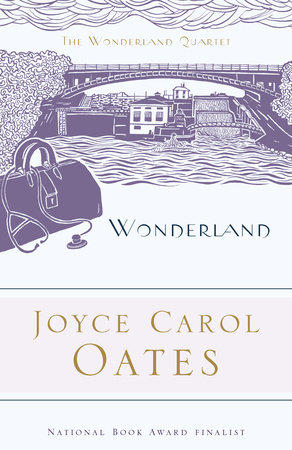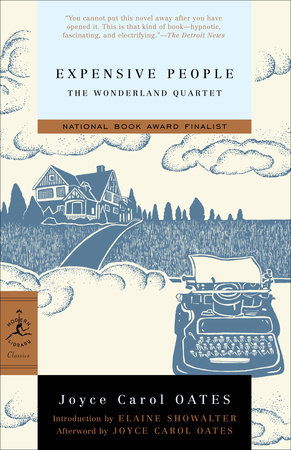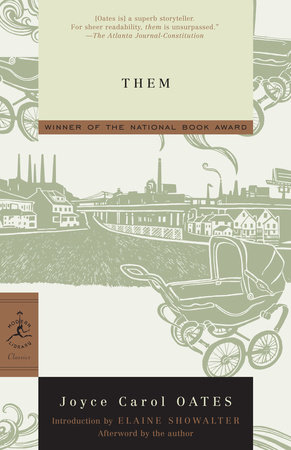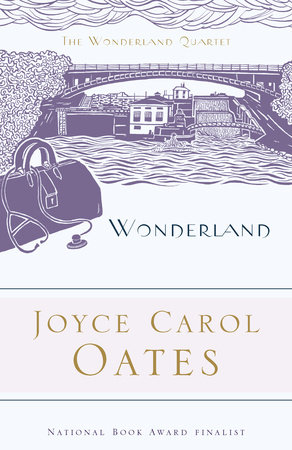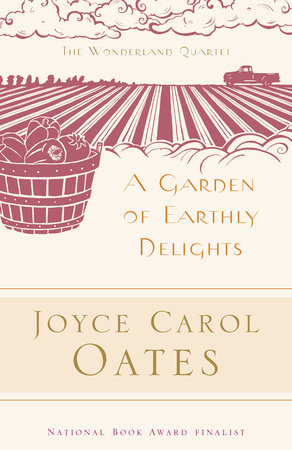Excerpt
Wonderland
1
Jesse wakes, startled.
Someone has passed by his bed . . . ? And through to the front room, footsteps going to the kitchen, to the door . . . ?
Jesse's father, unable to sleep. All that fall and winter he has been unable to sleep much of the night. He puts on his jacket, goes outside, walks, walks. . . . Jesse goes to a window where he can see out back: yes, it is his father, shoving an arm through a sleeve of his jacket as he walks, in a hurry, his head slightly lowered, as if in a baffled blind rage, like a hunter. . . .
Jesse's heart pounds with fear. He has seen his father like this in the past, but now it is nearing Christmas, now there is a light, quick tone to the air, an expectation in faces, that his father does not know about, is violating. . . .
Jesse goes back to bed but cannot sleep himself.
It is raining there, in that country.
It is more than thirty years ago and raining, a cold, fierce, driving rain, rushing across the streets of that town--Yewville, New York--out of a thick, boiling December sky. The main street is fairly busy this morning, in spite of the weather. It is the middle of the month and the middle of the week. Cars splashed with old mud maneuver around other cars waiting to park in the narrow street; pickup trucks move by slowly; a Greyhound bus, its exhaust billowing, comes to a stop in front of the bus station, which was once a gas station, now painted white. The white is too white on this strange day; it glares and makes the eye tremble. . . . Up and down the street people are walking, hurrying against the rain. As they hurry, their heads ducked, umbrellas raised, the rain begins to turn into bits of ice. A quick magical change. The dots of ice strike faces, the windshields of cars, the store windows. . . . On the bumpy surface of the street, which is gleaming wet, a million bits of ice strike and bounce. The sign for the Montgomery Ward's store is bombarded with hail and sounds like a drum. A Christmas streamer with its plastic bells and wreaths is struck, shudders in the wind, seems about to break in two. . . .
Most of Yewville is on either side of this street, Main Street--shoe stores, clothing stores, sporting goods stores, the bus station, the movie house, the post office in its fortress-like building, a few taverns, a gas station, a few restaurants. Then comes an expanse of vacant land, then the library, which shares a nondescript old building with the police station, then the high school, a complicated three-story structure made of dark rough brick, its windows high and narrow, its roof covered with black, rotting shingles. The hail strikes against the broad front sidewalk of the high school, running right up to the double front doors. It strikes against the windows, as if trying to break them. The windows show no amazement, no faces behind them.
The air looks as if it is coming apart--shredding into molecules of sand or grit. It is December 14, 1939.
This is the last day of school before Christmas vacation. School will end after assembly at one o'clock. In the narrow, dingy halls of the school students are filing along, heading for the auditorium and its warped seats, its overheated boisterous cozy air. They make a crashing noise on the stairs, coming down from the second floor, the older boys clowning, almost out of control. Their legs are long, their faces bright and blurred, as if intoxicated. One of their teachers, a woman of middle age, makes an angry gesture and they turn away, laughing together. Everywhere there is a smell of wet wool. As the students pass along the corridor they strike the lockers with their fists in a kind of giddy rhythm, their excitement almost out of control. There is a bouncy, hollow, drum-like urgency to the air. Jesse is going to remember this. Already the high school is overcrowded, though an addition was built only fifteen years ago. Boys from the country, surging and clumsy in their overalls, stomp along the hall heavy as farm animals, banging their fists against the wall. The girls walk quickly, in little clusters, as if fearful of the boys. They are all wearing bright red lipstick. Their lips move and are very red. Because it is the last day of school before Christmas recess, they are dressed up, in wool dresses and stockings and high heels. "Is it snowing? Is it snowing?" they ask, their voices lifting shrilly, as if they were testing the air itself, their necks stretching in front of the boys' eyes.
At the doors to the auditorium a few teachers are posted. The students pass close by them, bending their heads meekly, automatically, even the big farm boys, cowed for the moment. Such a quick warm crowd of them! They are excited, giddy. The air rocks with their big feet and their giddiness. The familiar odor of wet wool is mixed with the unfamiliar odor of the girls' perfume, and everywhere there is the clatter of the girls' high heels. A girl cries out in surprise--someone has run his finger sharply down her backbone, which is outlined through her pink wool dress. She turns, pretending anger. One of the teachers snaps at her: "Never mind! Keep on going!"
They file into their seats, jostling one another, laughing behind their hands; on stage, the choir is already singing to welcome them in. On the right of the stage is a large Christmas tree, donated by the Yewville Firemen, lit up with strings of light, also welcoming them in. The choir sings "Hark the Herald Angels Sing" to march them into their seats. A sprightly, energetic tempo. The girls are attentive and bright-faced. Their eyes are serious. The boys are very much together, in their own clusters; at certain places a boy must sit beside a girl, accidentally, and the two clusters come together. The choir is made up of about twenty students, mostly girls, and it is conducted by a very small, careful woman with gray curls, her back to the crowd, her arms moving in short, precise, finicky circles. The voices rise and fall, singing, marching the other students into place: "Hark the Herald Angels sing . . ." and "sing" has two syllables, both equally accented.
The mood of the students changes gradually; it is not so rowdy now. Seated, the country boys are not so impatient. Their eyes are fixed upon the chorus and the Christmas tree. Their hands lie quiet upon their knees or are folded formally in their laps, a gesture that is automatic.
The curtain behind the choir is made of velvet, a deep magenta: the high school's color. Initials Y.H.S. in cream upon this magenta. Arranged in rows according to height, the chorus sings in front of this impressive curtain, and the Christmas carol is mixed with the initials, the flushed excited faces of the singers, the movements of the choir director's arms inside her frothy sleeves. . . . Something is going to happen: it is a special assembly, a special day.
No windows in the auditorium. One boy, seated on the aisle, keeps glancing back at the doors as if anxious about the weather, or about getting out. The third time he looks around, the boy sitting directly behind him thumps the back of his seat. "Hey, what're you looking for?" he says.
"No one. Nothing," the boy says.
The boy who has been looking around straightens in his seat, forces himself to stare straight ahead. He has red-blond hair. His complexion is not a redhead's complexion, though: it is darker, as if still tanned from the summer. The boy's face is broad and intelligent, but creased with thought or worry; he has become very nervous. For the fourth time he looks around--now they are closing the doors to the auditorium! He will not be able to get out. The boy stares up the narrow aisle to those closing doors, ignoring the taunts of the boy behind him, ignoring his teacher's concern. She is a woman in her forties, heavyset and hearty and wise, with a liking for Jesse, but today Jesse has no mind for her or for anyone else. The chorus is beginning another carol. The words are soft and cajoling, like snow; they are meant to entice and make quiet--"O Little Town of Bethlehem"--but Jesse can't pay attention to them. He must get out of this seat, out of this packed hot auditorium, he must get back home. . . .
His father had gone out that morning before dawn. Stomping out the back path to the woods, his head lowered. . . .
Jesse suddenly stands, confused.
He feels himself blushing, even his neck is blushing. He hurries up the aisle, which tilts slightly, so that he has the impression of forcing himself up an invisible hill, a small stubborn obstacle meant to tease him. Someone whistles and calls out, "Hey, Jesse!" It is his cousin Fritz, grinning. He does not make any sign to Fritz. At the very rear of the auditorium his sister Jean is sitting, and his eye flies immediately, miserably, to her, to her stern face. She is two years older than he, sixteen, with a full, spry little body and an attractive red mouth. But now she looks angry, because Jesse has embarrassed her. There is a fierce, fine little frown on her forehead.
Tonight at supper she will say, "Jesse couldn't go to the bathroom before assembly, oh no, he had to wait until it began and then he excused himself. . . ." And Jesse will sit at the table in a fury of shame and hatred, unable to defend himself, wishing his sister dead.
The high school principal, Mr. Fuller, is standing at the doors. Jesse whispers that he doesn't feel well, may he be excused? But Mr. Fuller can't hear him and so he has to say aloud, in his raspy, hoarse, frightened voice, "I feel sick . . . may I be excused . . . ?"
Mr. Fuller nods gravely, suspiciously. But he does not allow Jesse to open the door himself; he goes to it and opens it wide, so that Jesse must pass through close to him, half stooping beneath his arm.
Jesse hurries down the corridor. His heart is still pounding, his face flushed. The skin of his face is almost painful, it is so flushed. Behind him the choir is singing now of a little town that is filling up softly with snow, its music misty and unreal, fading now behind the closed doors; outside there is hail, real snow, violent and wild. Jesse stares out a window. The sidewalk is trod upon by a thousand angry feet--invisible feet; there is a raucous ringing to the air that drowns out the choir's song for Jesse. Bethlehem. Christmas. His mind jumps from high school and Yewville to the highway, to his home, his father's gas station and the house a hundred yards behind it, off the highway, meager and dull in the storm. The gas station is now closed. Closed permanently. Jesse's father had closed it, boarded it up, just the day before.
Closed: a sign Jesse's father had painted himself with old black paint.
Jesse helped him nail up the boards without being asked. He wanted to say to his father's angry, silent back: "Why are you hammering so hard? Why are you making so much noise?" Nails struck deep into the wood, nails struck sideways and bent, twisted helplessly . . . nails dropped and lost in the tall grass. . . . But Jesse said nothing. He helped his father board up the little gas station, with lumber from an old pile behind the house, and his father hammered the boards in place, in a row, then crisscrossing on top, as if there were thieves who might want to break into this old place, cunning thieves who might be watching them right at this moment, plotting. Jesse wanted to say to his father gently: "But nobody will break in here. . . ." He wanted to ask, while his father hammered so loudly: "Why are you so . . . why are you so strange today?"
Why are you so strange? he thinks now.
The high school is seven miles from home. Out there, at the intersection of the highway and the Moran Creek Road, the gas station is boarded up, closed permanently, and behind it is the old jumble of wrecked cars and motorcycles and lumber and tires, and behind that the small frame house is gleaming with a sudden freakish burst of sunlight, hail bouncing on its roof. . . .
He must leave school and go home. Closing his eyes, he imagines the house: the gleaming roof, the hailstones, the rotting lumber pile. His father had bought the gas station, but he had built the house himself over the years. Hard work. There were a few sheds, and a garden ragged from late fall, a few trees. Wild bushes. Then the fence of rusted wire and the beginning of Mike Brennan's farmland . . . but it was not Brennan's any longer, it had been sold to someone else, a stranger, who did not live in the area or even in Yewville. A stranger. Everyone talked about this stranger for a while, wondering when he would show up. Jesse's mother said, "It's somebody with money to throw away, that's for sure. What would he want with that old dead farm!" She always spoke of other people's farms and businesses with a certain haughty, mocking look.
Jesse can hear her voice plainly.
She is seven miles away.
School will be dismissed in another hour, but Jesse won't be able to go home then. He has to work at Harder's, then get a ride home with a neighbor at five o'clock. That is four hours away. His heart pounds, seems to lunge in his chest. . . . He thinks of his mother: her light, red-blond hair, her eyes almond-shaped and clever and frank. He takes after her, people say, more than after his father. But he is thinner than either of them. He is very thin, his feet long and narrow. He is quite tall for his age--five foot seven--taller than his mother now. Did she hear Jesse's father go out this morning so early?--out the back door and into the woods, alone? If anyone talks about Jesse's father she smiles and looks away, something passes over her face, quickly, cleverly, and she is silent. She hums under her breath.


